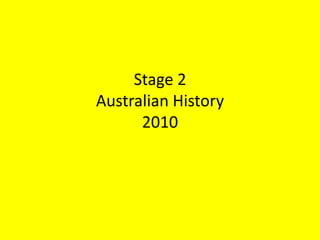
C:\Fakepath\Wednesday Wk 1
- 2. Within this course, we will be studying two key topics: Term One: Topic 11 Experiencing the Northern Territory: A Social, Economic, Cultural & Political History of the Northern Territory, 1824 to the present Term Two: Topic 5 The Unwanted, the Seekers, and the Achievers: Migration to Australia, 1830 to the present
- 4. Terms One to Three You will also be undertaking an Individual History Essay on a topic of your choice from Australian History.
- 5. Assessment 40% of your grade for this subject comes from assessments you will undertake as part of classwork. You will complete EIGHT Summative assessments, as well as a number of formative assessments. Your first Summative assessment is a Source Analysis test in Thursday, Week 2.
- 6. 20% of your final mark will come from your Individual History Essay The remaining 40% of your final mark will come from the end of year exam. This is 3 hours long: you will write 2 essays and undertake 1 Source Analysis.
- 7. Requirements As this subject will have a lot of handouts it is recommended that you get a separate Australian History folder. Please take all notes in your History exercise book. Keep this book inside your folder. Begin each lesson by writing the day and week we are in: eg Wednesday, Week 1, Term 1, 2010
- 8. Extension Policy In the event that a student should require an extension, this will need to be arranged before the due date. If this is impossible, students are asked to provide a parental note explaining the reasons for their inability to complete a task, including a future date by which the task will be completed.
- 9. Missing Lessons Students are encouraged to take all possible measures not to miss lessons. While sickness is obviously unavoidable, students are asked not to schedule appointments and driving lessons during Australian History time. In the event of absence, students are expected to take responsibility for making up on work missed. This includes: collecting any handouts from the teacher photocopying notes taken during the missed lesson from other students copying and looking at the relevant lesson’s Powerpoint from the Student Public Drive completing and submitting any work missed
- 10. I can be reached by email at sarah.moller@nt.catholic.edu.au, or via telephone through O’Loughlin College reception. Students are permitted to send drafts to this address but please note, assessments WILL NOT be accepted by email unless under extenuating circumstances.
- 12. Australia
- 13. Some questions... Who found Australia first? Who settled Australia? Why do we celebrate Australia Day? How old is the NT?
- 16. From the Australian Department of Foreign Affairs and Trade website: Before the arrival of European settlers, Aboriginal and Torres Strait Islander peoples inhabited most areas of the Australian continent. They spoke one or more of hundreds of separate languages and dialects, and their lifestyles and cultural traditions differed from region to region. Their complex social systems and highly developed traditions reflect a deep connection with the land. Asian and Oceanic mariners and traders were in contact with Indigenous Australians for many centuries before the era of European expansion. Some formed substantial relationships with communities in northern Australia.
- 18. The first recorded European contact with Australia was in March 1606, when Dutch explorer Willem Janszoon (1571–1638) charted the west coast of Cape York Peninsula in Queensland. Later that year, the Spanish explorer Luis Vaez de Torres sailed through the strait separating Australia and Papua New Guinea. Over the next two centuries, European explorers and traders continued to chart the coastline of Australia, then known as New Holland. In 1688, William Dampier became the first British explorer to land on the Australian north west coast.
- 19. 1767
- 20. It was not until 1770 that another Englishman, Captain James Cook, aboard the Endeavour, extended a scientific voyage to the South Pacific in order to further chart the east coast of Australia and claim it for the British Crown.
- 23. Britain decided to use its new outpost as a penal colony. The First Fleet of 11 ships carried about 1500 people – half of them convicts. The fleet arrived in Sydney Harbour on 26 January 1788, and it is on this day every year that Australia Day is celebrated.
- 25. About 160 000 men and women were brought to Australia as convicts from 1788 until penal transportation ended in 1868. The convicts were joined by free immigrants beginning in the early 1790s. The wool industry and the gold rushes of the 1850s provided an impetus for increasing numbers of free settlers to come to Australia.
- 27. Scarcity of labour, the vastness of the land and new wealth based on farming, mining and trade made Australia a land of opportunity. Yet during this period Indigenous Australians suffered enormously. Death, illness, displacement and dispossession disrupted traditional lifestyles and practices.
- 29. The Commonwealth of Australia was formed in 1901 through the federation of six states under a single constitution. The non-Indigenous population at the time of Federation was 3.8 million, while the estimated Indigenous population was around 93,000. Half of the people lived in cities, three-quarters were born in Australia, and the majority were of English, Scottish or Irish descent.
- 30. Topic 11 Experiencing the Northern Territory: A Social, Economic, Cultural & Political History of the Northern Territory, 1824 to the present